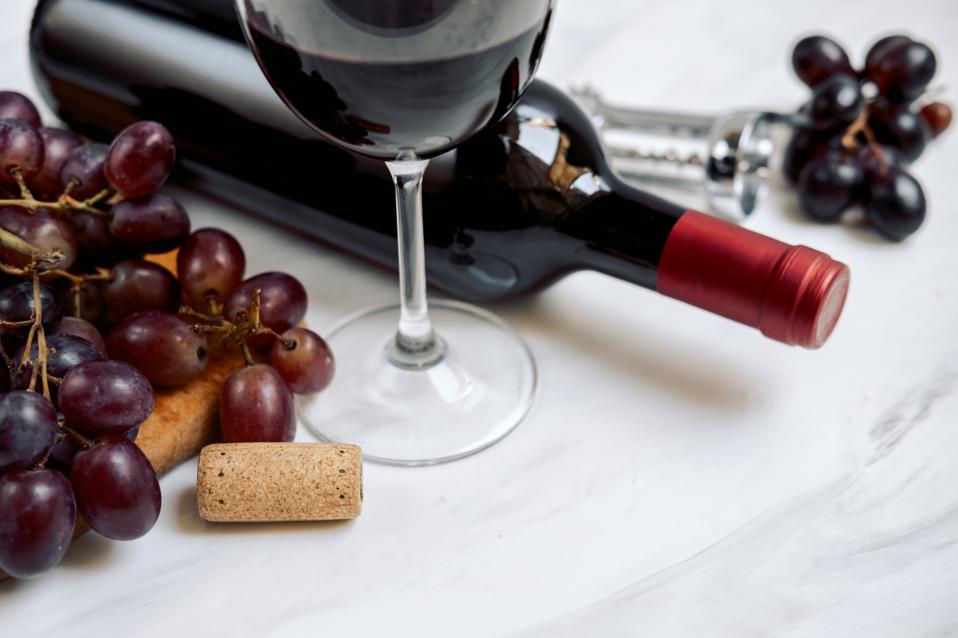
Glass of Red wine and bottle and fresh grape
getty
Pinot Noir has a reputation as the “heartbreak grape.” It’s fussy in the vineyard, tough to grow, and just as tricky in the winery. But when it all comes together? A good Pinot can age into something magical—layered, complex, and totally different from the bright, fruity bottle you bought off the shelf.
The thing is, not every Pinot is meant to sit around for years. Some are best enjoyed right away, while others can handle a decade (or more) of rest. Here’s how to tell the difference—and how to get the most out of your bottle.
What Happens to Pinot Noir as It Ages?
Signage for Pinot Noir grapes in a vineyard at late harvest in Yarra Valley, Australia
getty
Young Pinot is all about juicy red fruit—cherry, raspberry, strawberry—with zingy acidity and a silky texture. Over time, those flavors shift and new ones step up.
Fruit tones change: Bright berries soften into dried cherry, fig, or even a jammy compote.Earthy notes appear: Think mushroom, truffle, spice, and that “forest floor” vibe Pinot lovers crave.Texture mellows: Tannins smooth out, making the wine even more seamless.Acidity keeps it fresh: That natural lift is what makes Pinot such a graceful ager.
The payoff is a more layered, thoughtful sip—if the wine had the right bones to begin with.
Not All Pinot Noir Is Meant to Age
Here’s the truth: most Pinot Noir on the market is made to be enjoyed young. Winemakers often lean into juicy fruit and soft textures, especially in California, Oregon, and New Zealand, so those bottles shine within a couple of years.
Signs your Pinot can age:Where it’s from: Cooler-climate spots like Burgundy, Oregon’s Willamette Valley, or coastal Sonoma often produce more structured wines.The producer: Serious wineries with a track record of age-worthy Pinots are your best bet.How it tastes now: If it’s got firm acidity, a bit of tannic grip, and concentrated fruit, it’s probably got some runway.
If it’s a $20 weeknight Pinot, don’t overthink it—drink it now while it’s fresh and fruity. But if it’s a high-end Burgundy or a top New World bottling, it might reward a few years of patience.
How Long Should You Wait?
Prosciutto ham with parmesan, ciabatta and red wine
getty
It depends on the style, but here’s a cheat sheet:
Everyday Pinot ($15–$30): Best within 2–3 years.Premium New World Pinot (California, Oregon, NZ): 5–7 years, sometimes longer.Top Burgundy (Premier Cru, Grand Cru): 10–20 years if stored well.
Keep in mind Pinot is about elegance, not raw power. Wait too long, and the fruit can fade, leaving you with a wine that’s more “interesting” than actually fun to drink.
How to Store It
If you’re going to age Pinot, storage is everything. Bad conditions can ruin even the best bottle.
Temperature: Around 55°F (13°C), steady as possible.Humidity: Moderate, to keep corks from drying out.Light: None—UV light is wine’s enemy.Position: Bottles on their side, so the cork stays moist.
A wine fridge is the safest bet, but a cool, dark basement or closet can work short-term.
How to Know It’s Ready
wine grower picking grapes or doing the harvesting in vineyard close up as sun shines through vine leafs – harvest time in wine industry
getty
This is where you get to play detective.
Check the vintage: Some years are built to last longer than others.Buy more than one: Open one early, then see how the rest evolve.Look for signs: If the cork is pushing up or the fill level is low, it might be past its prime.
And when you do open it, give it a little air. A gentle decant or even just an hour in the glass can bring out those subtle, aged aromas.
The Bottom Line
Red wine tasting at home: wine bottle, wineglass, corkscrew and candles on a table in the living room at night
getty
Aging Pinot Noir can turn a great wine into something unforgettable—but timing matters. Store it right, know what kind of bottle you’ve got, and don’t be afraid to pull the cork while the fruit is still singing.
Because with Pinot, the biggest heartbreak isn’t growing it—it’s waiting too long and missing its sweet spot.

